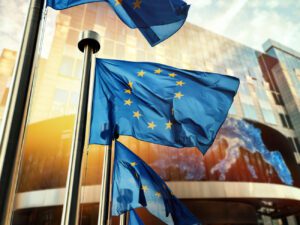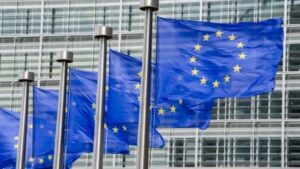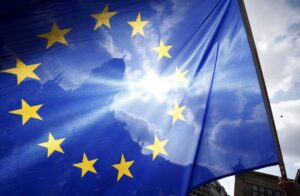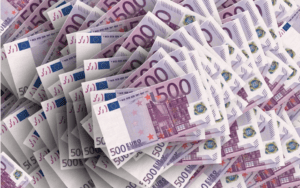
The European Commission will insist on granting Ukraine the status of a candidate member of the EU, the final decision rests with the European Council, Politico reported.
“The European Commission will recommend granting Ukraine formal EU candidate status, according to several officials familiar with discussions that took place during a debate among commission members on Monday,” the statement said on Tuesday night.
The debate in the College of Commissioners followed a visit on Saturday by Commission President Ursula von der Leyen to Kyiv, where she discussed Ukraine’s membership bid with President Volodymyr Zelensky.
Zelenskiy and other Ukrainian officials have pushed for formal recognition as an EU candidate country, saying the appointment would provide an invaluable morale boost during the war. “They repeatedly noted that after the 2013-2014 Maidan revolution, the citizens of Ukraine repeatedly risked their lives – and indeed, thousands have now died – fighting for a free, democratic future in the EU,” the publication stressed.
“The Commission does not forget that Ukraine is the only country in Europe where people died, where people were shot because they were on the streets with EU flags. Now we cannot tell them: “Sorry guys, you were waving the wrong flag” , – quotes his source Politico.
It is noted that supporters of Ukraine’s bid said that any delay in granting candidate status would be deeply demoralizing for Ukraine, as invading Russian troops temporarily occupy large swaths of the south and east of the country and seek to capture the entire eastern region of Donbass.
During discussions about the status of the candidates for Ukraine, Moldova and Georgia, many EU officials and diplomats noted the sensitivity, given the slow pace of accession of the Western Balkans, which was declared a candidate country more than 10 years ago.
“Monday’s debate among commissioners raised broader questions about what an enlarged EU might look like in the future, including whether there would still be one commissioner per member state. The discussion also touched on the possibility that the upcoming summit, some EU leaders may try to impose conditions on Ukraine’s candidacy or return to the idea of granting some new status that does not correspond to the official candidacy.
According to the information from the representative of the Elysee Palace, the status of the candidate, if it is granted, will be only the beginning of a much longer process.
“Once Ukraine potentially gets candidate status, we also have to see when negotiations start. And you know that the EU membership methodology provides for chapter-by-chapter negotiations and reversible negotiations depending on how the country develops. So there are requirements that are in line with EU standards. , and in any case they will be very demanding of Ukraine,” the spokesman said.
In Kyiv, Igor Zhovkva, deputy head of Ukrainian President Zelensky’s office, said there was no alternative to nominating a candidate. “We will not accept any alternatives, nor compromises, as some leaders tell us, nor deviations from this candidate status,” Zhovkva was quoted as saying by the publication.

The European Commission has presented a set of actions to help Ukraine export agricultural products, the so-called “Solidarity Lanes.”
The plan was presented by European Commissioner for Transport Adina Vălean in Brussels on Thursday.
The European Commission said these proposals are presented as part of the EU solidarity reaction with Ukraine and will help Ukraine export its agricultural products. “Following Russia’s invasion of Ukraine and its blockade of Ukrainian ports, Ukrainian grain and other agricultural goods can no longer reach their destinations. The situation is threatening global food security and there is an urgent need to establish alternative logistics routes using all relevant transport modes,” the European Commission said.
According to the European Commissioner, some 20 million tonnes of grains have to leave Ukraine in less than three months using the EU infrastructure. “This is a gigantesque challenge, so it is essential to coordinate and optimize the logistic chains, put in place new routes, and avoid, as much as possible, the bottlenecks. Our communication addresses the emergency solutions but also medium and long time measures to better connect and integrate Ukraine’s infrastructure with the EU one. For both short-term and long-term solutions, we will work with the Ukrainian authorities and in close collaboration, especially with the neighbouring Member States, who spared no effort in helping during this crisis,” Vălean said.
According to the press release issued in this regard, as of today, in spite of immediate efforts by the EU and its Member States to ease border crossings between Ukraine and the EU, thousands of wagons and lorries are waiting for clearance on the Ukrainian side. “The average current waiting time for wagons is 16 days, while it is up to 30 days at some borders. More grain is still stored and held back in Ukrainian silos ready for export. Among the challenges are differing rail gauge widths: Ukrainian wagons are not compatible with most of the EU rail network, so most goods need to be transhipped to lorries or wagons that fit the EU standard gauge. This process is time-consuming and transhipment facilities along the borders are scarce,” the European Commission said.
In address these obstacles and set up the Solidarity Lanes, the Commission, together with Member States and stakeholders, will work on the following priority actions in the short term.
The first priorities are additional freight rolling stock, vessels and lorries. “The Commission calls on EU market players to urgently make additional vehicles available. In order to match demand and supply and establish the relevant contacts, the Commission will set up a matchmaking logistics platform and ask Member States to designate dedicated Solidarity Lanes contact points (a ‘one-stop-shop’).”
Another priority is the capacity of transport networks and transshipment terminals: the export of Ukrainian agricultural products should be prioritized, and infrastructure managers should make rail slots available for these exports. “The Commission also calls on market players to urgently transfer mobile grain loaders to the relevant border terminals to speed up transhipment. A road transport agreement with Ukraine will also remove bottlenecks,” the European Commission said.
Among the priorities are customs operations and other inspections and storage of products in the EU. To this end, the Commission urges national authorities to apply maximum flexibility and to ensure adequate staffing to accelerate procedures at border crossing points.
In the medium to long term, the Commission will also work on increasing the infrastructure capacity of new export corridors and on establishing new infrastructure connections in the framework of the reconstruction of Ukraine. “The next round of Connecting Europe Facility (CEF) calls for proposals will allow support for projects improving transport connections to Ukraine, including for railway connections and rail-road terminals. Against this background, the Commission today adopted a Decision with a view to signing a high-level agreement with Ukraine, updating the maps for the Trans-European Transport Network (TEN-T), as part of the Commission’s policy on extending the TEN-T to neighbouring countries.”

The European Commission will soon submit a report on the readiness of Moldova, Ukraine and Georgia to join the European Union, European Council President Charles Michel said.
“We discussed in detail the issues of EU enlargement a few months ago, at the conference in Versailles. After that, three countries applied for accession. We made a decision very quickly, instructing the European Commission to carry out work and prepare reports on these countries. We made a decision in a few days, although it usually took 8-9 months. By the end of June, the European Commission will publish this report, and we will decide how to proceed further,” Michel said at a joint press conference with Moldovan President Maia Sandu during a visit to Chisinau.
He stressed that the EU will continue to act promptly.
“We will act immediately to strengthen ties with Moldova, Ukraine and Georgia, to support them in the current difficult situation. This will be a political process in the context of how we see the development of the European Union. In the next two months, we will give a clear signal of what we want to enlarge the European Union,” the President of the European Council said.
For her part, Moldovan President Maia Sandu stressed that “European integration is the choice of the country, the choice of the people.” “On April 22, we submitted to Brussels the first part of our responses to the European Commission’s questionnaire. In the near future we will also pass on the second part. We understand that integration into the EU is a long process, we are not looking for short and easy ways. We intend to continue reforms. Most importantly – peace is needed for this, everything must be done to restore peace,” Sandu stressed.

Prime Minister Denys Shmyhal says the European Commission has proposed suspending all import duties on all Ukrainian exports to the European Union for a year.
“Today, the European Commission proposed to suspend for a year all import duties on all Ukrainian exports to the European Union. This is an unprecedented gesture of support for our country. The EU has never taken such massive trade liberalization measures in any country before. This opens up additional opportunities for our business, and our products become more competitive in the European market. We negotiated the abolition of duties with our European colleagues, and we are grateful that they heard us and supported Ukraine,” Shmyhal wrote on the Telegram channel.
Shmygal also said that the government has agreements and is negotiating with Poland, Romania, Lithuania, Germany and other countries to allow Ukrainian exports through the ports of these countries.
“We are working further so that, in addition to the EU countries and the UK, our other allies will also take the decision to abolish duties on Ukrainian products,” he wrote.
EUROPE, EUROPEAN COMMISSION, IMPORT DUTIES, UKRAINIAN EXPORT

The European Commission will provide an opinion on Ukraine’s possibility of obtaining the status of a candidate member of the EU by the end of June, after which the European Council will be able to start a discussion on this issue, President of the European Council Charles Michel said.
“We will have the opinion of the Commission by the end of June. And it will be my responsibility to assess when I can put this issue on the agenda of the European Council, to make sure that we have a political discussion, a dialogue, to make progress on this path. But I I want to say that I feel very strong support to make sure that we can provide concrete support to Ukraine in your choice to follow the path to the EU in your future,” Michel said at a press conference with Ukrainian President Volodymyr Zelensky in Kyiv on Wednesday.
He stressed that Ukraine demonstrates adherence to democratic principles and freedoms every day.
“You are fighting not only for the future of the children of Ukraine. We know that you are fighting for European fundamental principles and values,” Michel stressed.

The European Commission (EC) put forward on Friday a proposal for the recommendation of the EU Council on the conversion of hryvnia banknotes into the currency of the member states hosting Ukrainian refugees. “This proposal complements the humanitarian assistance provided by the EU to those who flee Ukraine, in particular when they move through the territory of the union, and it is fully consistent with EU law on asylum and foreign policy,” the EC communique published in Brussels reads. The document says that since the beginning of Russia’s invasion of Ukraine, more than 3.8 million people have arrived in the European Union fleeing the fighting. One of the urgent needs of refugees is the conversion of their hryvnia banknotes into the currency of the host country. “Today’s proposal aims to promote a coordinated approach for all Member States to offer those fleeing Ukraine the same conditions for converting their hryvnia banknotes into local currency, regardless of the Member State they are in,” the statement said. European Commission. Brussels explains that this approach was necessary due to the fact that the National Bank of Ukraine was forced to suspend the exchange of hryvnia banknotes for foreign cash in order to protect Ukraine’s limited foreign exchange reserves. As a consequence, credit institutions in the EU Member States are reluctant to make the exchange due to the limited convertibility of hryvnia banknotes. Some EU Member States are considering introducing national schemes that support the conversion of a limited amount of hryvnia per person, and the aim of the Commission, as the communiqué suggests, is to consistently promote such schemes. These schemes should include a maximum limit of UAH 10,000 per person, and the duration of such schemes should be at least three months.